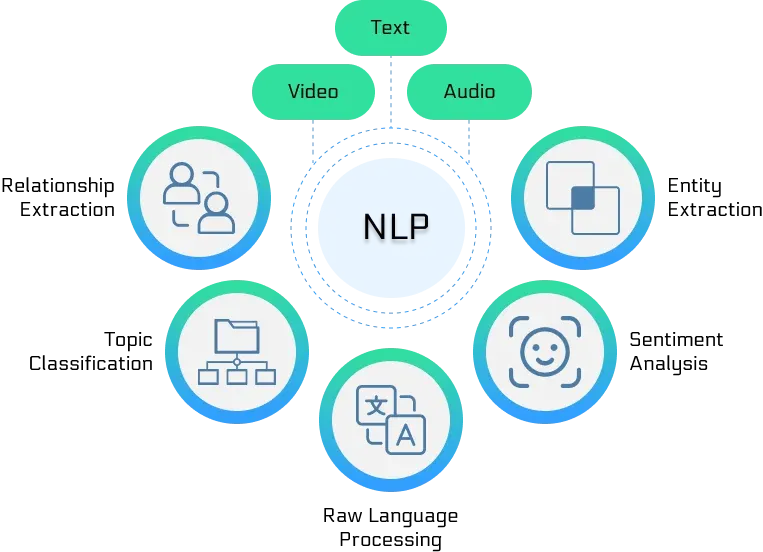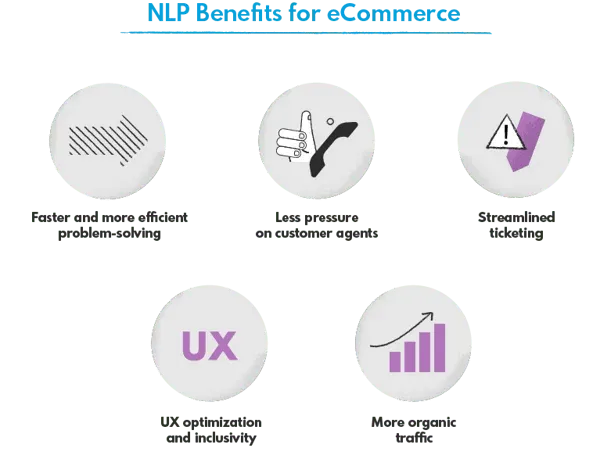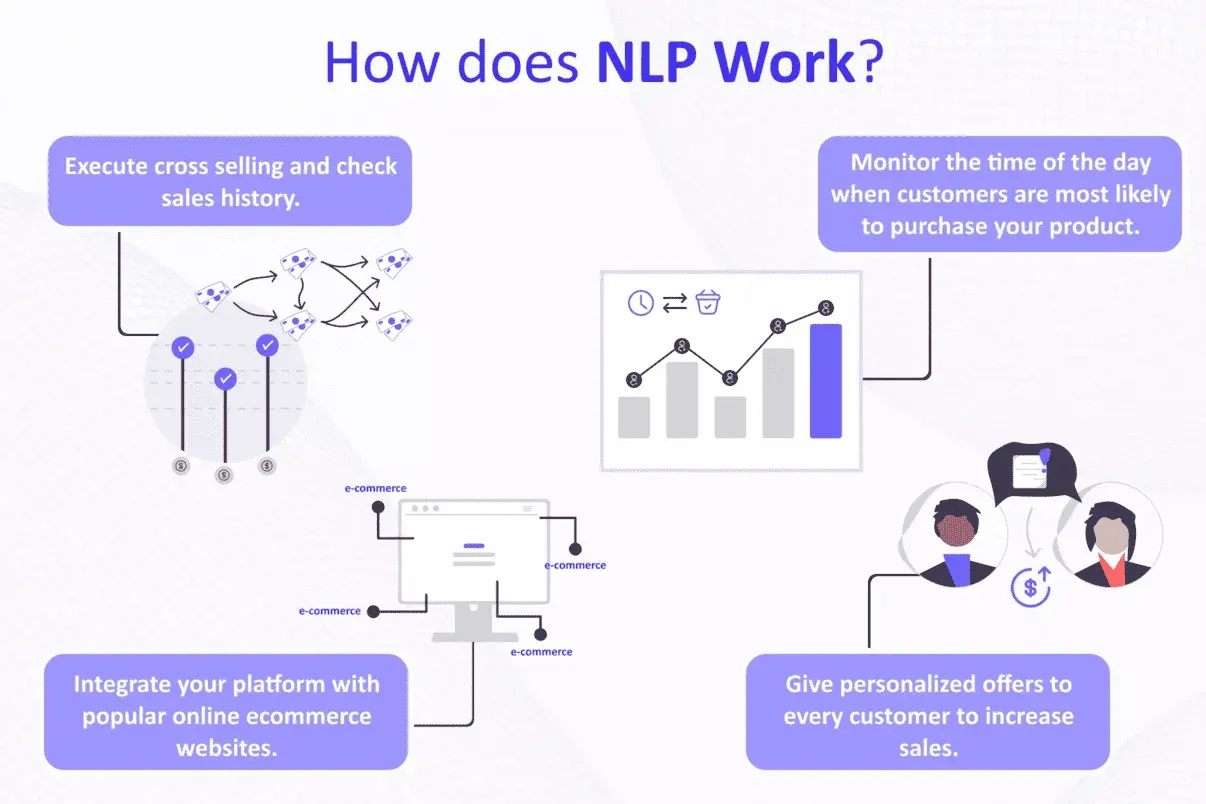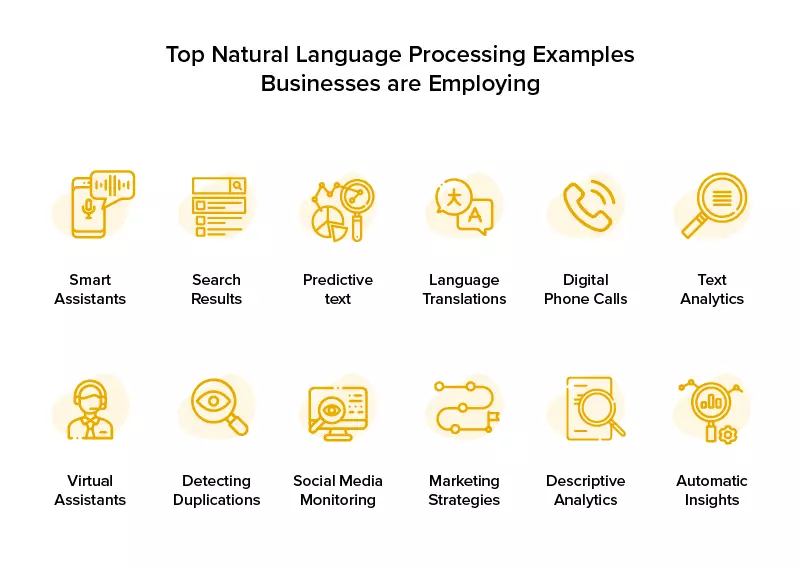Imagine being able to decipher online buyer's intent, not just keywords.
Picture optimizing product recommendations to match individual preferences.
Think about having chatbots fluent in the language of your customers, working around the clock.
That's the power of Natural Language Processing (NLP).
NLP, a marriage of artificial intelligence and linguistics, understands, interprets, and generates human-like conversation. In ecommerce, NLP isn't just a nice add-on. It's becoming the cornerstone of customer experience, driving better engagements and higher revenue.
But like any tool, NLP isn't flawless. It's prone to misinterpretations and raises valid concerns about data privacy.
Navigating the potential rewards and pitfalls successfully, requires a thorough understanding of NLP's capabilities, its implementations, and challenges.
Ready to explore this fascinating terrain of technological progress in ecommerce?
Understanding the Basics of NLP
Natural Language Processing, or NLP, is tech talk for teaching machines to understand human language.
Think of it as a bridge that links humans and machines. It's the reason you can ask your phone a question and get an answer. But how does it work?
NLP is about processing and analyzing text or speech from humans. It’s divided into two parts: understanding and generation.

Understanding is about taking in-text or spoken words, and figuring out what they mean. Say you tell your phone "Play 'Happy'". The NLP system understands 'play' as a command, and 'Happy' as a song title. Not so magic now, is it?
Generation moves things up a notch. This is where machines make text or spoken words that make sense to us. Remember, when you ask your GPS "How do I get home?" and it gives you directions? That's generation at work.
But NLP isn't just about getting meanings. It's also about understanding context, irony, or emotion. And it uses stuff like grammar rules, machine learning, and statistical models to do it.
Key NLP tasks include sentiment analysis, machine translation, word tagging, and so on.
Sentiment Analysis: Imagine a business wants to know if customers like its product. It might use sentiment analysis.
This sees if customers' social media posts are positive or negative.
Machine Translation: This should sound familiar. Think Google Translate. It changes text or speech from one language to another.
Word Tagging: This is about labeling words. For example, is "can" in a sentence an object or a verb?
So yes, NLP might sound complex. But cut through it all, and it's a tool that makes communication with machines easier. And for businesses in ecommerce, that’s a game-changer.
Suggested Reading:Exploring the Benefits of NLP for Ecommerce Businesses
Benefits of NLP for Ecommerce Businesses
Understanding human language opens doors in ecommerce. NLP offers unique benefits here. It can make a customer's journey smooth and efficient. Let's see how.
Improved Search Functionality
When shopping online, finding the right product matters. That’s where NLP comes in. It improves search results.
With NLP, a search isn't just about keywords. It's about understanding the intent behind them.
Think of an online shopper looking for 'green striped dress for girls'. A basic search might show green dresses, striped dresses, and girl's clothing.
But not exactly what the shopper wants. NLP brings all these keywords together. It understands the intent. So it shows exactly what the shopper wants - green striped dresses for girls.
So, with NLP, search results line up more with the shoppers' intent. Shoppers find what they want more quickly. And that means more satisfied customers and better sales for the online businesses.
Enhanced Customer Service
NLP takes customer service to next level. It enables chatbots to talk almost like real people. They understand customers' questions.
They respond efficiently, any hour of the day. And the best part is, they learn.
The more you use these chatbots, the better they understand.
Let's use an example. A customer asks a chatbot, "What's my order status?". The bot gets it. It gives the update.
Now, the customer asks, "When will it arrive?". The bot understands the 'it' is the order. So, it provides the delivery date.

Better Product Recommendations
Ever browsed for a product then had it pop up in recommendations? That's NLP at work.
NLP gathers and processes customer data. It patterns shopping habits and any preferences. Then it recommends products accordingly.
Take a customer who often buys organic products. NLP can pick up on the 'organic' preference. Now, when this customer shops, the site can recommend other organic items. NLP customizes the shopping experience. It helps businesses upsell to the customers.
Effective Sentiment Analysis
Online businesses want to know what customers think. This info helps them make better products and offer better service.
Here, NLP helps with sentiment analysis.
Sentiment analysis checks customer feedback. It sees if people are happy, sad, frustrated, or excited. It tracks social media posts, product reviews, and customer chats.
So businesses know how they're doing. If feedback is bad, they can step in to fix things. If it's good, they know they're on the right track.
In all, NLP is a powerful tool for ecommerce. It makes the shopping experience better. For businesses, it offers a way to connect more with their customers. This doesn't just drive sales. It builds customer relationships, which is the core of successful ecommerce.
Case Studies of Successful NLP Use in Ecommerce
Natural Language Processing (NLP) is a game-changer in ecommerce. But rather than us telling you why, we thought we'd show you. Let's take a look at two real-life case studies.
These giants of ecommerce, Amazon and eBay, are using NLP to transform their businesses. They’re making shopping easier, improving customer service, and boosting sales.
From virtual shopping assistants to smart chatbots, they’re harnessing the power of NLP to deliver tangible benefits. Ready? Let's step into their world.
Suggested Reading:Exploring the Benefits of NLP for Ecommerce Businesses

Amazon's Alexa
Amazon's Alexa is a top-notch example of NLP in action. Alexa, a virtual assistant, uses NLP to understand and respond to voice commands.
Say you need to buy toilet paper. Just tell Alexa to add toilet paper to your Amazon shopping list. Alexa gets it. She does it.
In fact, Alexa can handle complex commands. You could say, "Alexa, order my usual from Domino's". She checks your order history, figures your 'usual', and places the order. That's clever. And it's NLP doing the magic.
The effect? Shopping is easy and fun. So customers come back more. Amazon's customer relationships strengthen. Alexa's success shows NLP can draw customers. It proves NLP can keep them coming back.
eBay's ShopBot
eBay, a leading online marketplace, uses NLP to guide customers. In 2016, it launched ShopBot, a shopping assistant.
ShopBot uses NLP to help customers find what they're looking for.
Here's how it works. Customers chat with ShopBot on Facebook Messenger. They might ask, "Find a black evening dress under $200".
ShopBot figures out the request's details. It then shows matching items to the customers.
But ShopBot can do more. It can ask further questions. Maybe it asks, "What dress size do you prefer?" or "Do you have a brand preference?". This refines the results. The customer gets exactly what they want.
The takeaway? ShopBot offers a personal touch. It makes shopping efficient and fun. Customers are sure to come back. And eBay gains more loyal shoppers.
Alexa and ShopBot use NLP to make shopping easier and enjoyable. They show how NLP can help ecommerce businesses. They prove NLP can build customer relationships. And in ecommerce, that’s a gold mine.
Potential Drawbacks of NLP in Ecommere
While Natural Language Processing (NLP) carries significant potential for the ecommerce world, it's not without certain challenges.
From misunderstandings due to lack of context to grave concerns over data privacy, these hurdles can potentially restrict the true power and scalability of NLP.
It's important for users and businesses alike to be aware of these drawbacks. Let's delve into these potential barriers and unpack them.

Misunderstanding and Lack of Context
While NLP is powerful, it's not foolproof. Sometimes it just doesn't get it. Take Siri, Apple's virtual assistant.
Ask her a metaphorical question, say, "Where can I hang my hat?". Siri might show you hat racks, when you're really asking where to settle down.
Data Privacy Concerns
NLP depends on data. But that raises privacy concerns. Amazon's Alexa caused a stir when it was found listening all the time, not just when summoned.
Users fretted about privacy. That's a hiccup for businesses. They have to balance powerful NLP functionality with data security.
In short, NLP's power in ecommerce is real, but not without snags. It's key for businesses to understand these challenges and address them carefully.
Conclusion
In the end, NLP can be a vital asset for growing ecommerce businesses. It can boost search functionality, enrich customer service, fine-tune product recommendations and decipher sentiment analysis.
Case studies from Amazon and eBay vividly illustrate the power of NLP. On the flip side, misunderstandings and privacy concerns pose challenges. It's clear businesses must tread carefully, balancing the rewards of NLP with its potential risks.
Done right, NLP offers a promising avenue to drive ecommerce success and serve customers better, while also remembering to safeguard their privacy and trust.
Frequently Asked Questions (FAQs)
How does NLP improve search functionality in ecommerce?
NLP improves search functionality by understanding the intent behind customer’s search queries, not just matching keywords.
This allows search engines to provide more accurate results that better align with a shopper's expectations, making it easier for them to find the exact products they're looking for.
What key benefits does NLP offer for ecommerce businesses?
NLP offers several key benefits for ecommerce businesses: improved search functionality, enhanced customer service, better product recommendations, and effective sentiment analysis.
These benefits help in creating a smoother customer experience, driving greater conversions and building stronger customer relationships in the long run.
How do giant ecommerce platforms like Amazon and eBay utilize NLP?
Amazon's Alexa and eBay's ShopBot are two examples of NLP in action in the ecommerce industry. Alexa uses NLP to understand and respond to voice commands, making shopping easier for users.
Similarly, ShopBot leverages NLP to understand customer's queries and provide personalized product recommendations through Facebook Messenger.
What are the potential drawbacks and challenges of NLP in ecommerce?
The main challenges of NLP in ecommerce are misunderstandings due to a lack of context and data privacy concerns. Misunderstandings can occur when an NLP system fails to grasp the subtleties or context of a query.
Data privacy concerns arise because NLP relies heavily on collecting user data, making it crucial for businesses to balance NLP functionality with data security measures.


